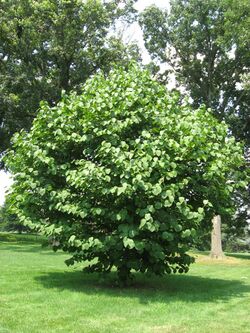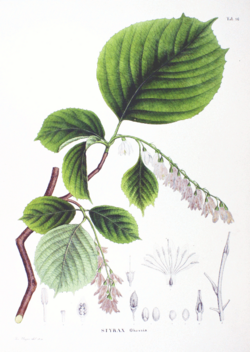Biology:Styrax obassia
From HandWiki
Short description: Species of flowering plant
| Styrax obassia | |
|---|---|

| |
| Scientific classification | |
| Kingdom: | Plantae |
| Clade: | Tracheophytes |
| Clade: | Angiosperms |
| Clade: | Eudicots |
| Clade: | Asterids |
| Order: | Ericales |
| Family: | Styracaceae |
| Genus: | Styrax |
| Species: | S. obassia
|
| Binomial name | |
| Styrax obassia Siebold & Zucc.
| |
Styrax obassia is a species of flowering plant in the family Styracaceae. It is native to eastern China, Korea, and Japan[1] (Hokkaido).
Taxonomy
The name of the plant is sometimes spelled Styrax obassis,[1] but the original spelling is obassia.[2] In the history of botany, different people have used all three grammatical genders for the genus Styrax, and reasonable arguments could be made for treating it as neuter, feminine, or masculine, although it has been recommended that masculine gender should be used.[3]
Description
Styrax obassia is a small tree or shrub, 10–14 m (33–46 ft) tall.[1]
Cultivation
Styrax obassis is cultivated as an ornamental plant in gardens.
References
- ↑ 1.0 1.1 1.2 Shumei Huang; James W. Grimes, "Styrax obassis Siebold & Zuccarini, Fl. Jap. 1: 93. 1839", Flora of China, http://www.efloras.org/florataxon.aspx?flora_id=2&taxon_id=210002133
- ↑ Philipp Franz von Siebold; Joseph Gerhard Zuccarini (1839), Flora Japonica, 1, p. 93, http://edb.kulib.kyoto-u.ac.jp/exhibit-e/b01/image/01/b01s0097.html
- ↑ Nicolson, D.H.; Steyskal, G.C. (1976), "The masculine gender of the generic name Styrax Linnaeus (Styracaceae)", Taxon 25 (5/6): 581–587, doi:10.2307/1220113
- E. Kato and T. Hiura, Fruit set in Styrax obassia (Styracaceae): the effect of light availability, display size, and local floral density, American Journal of Botany. 1999;86:495-501.
External links
- Flora Japonica (text), http://caliban.mpipz.mpg.de/siebold/flora1/high/CRW_6338_RT8.html
- Flora Japonica (plates), http://caliban.mpipz.mpg.de/siebold/flora3/high/CRW_6594_RT8.html
Wikidata ☰ Q845222 entry
 |




